人教版(2019)选择性必修第二册Unit 1 Science and scientist Using Language 课件(共48张PPT,内镶嵌音频)
文档属性
| 名称 | 人教版(2019)选择性必修第二册Unit 1 Science and scientist Using Language 课件(共48张PPT,内镶嵌音频) |
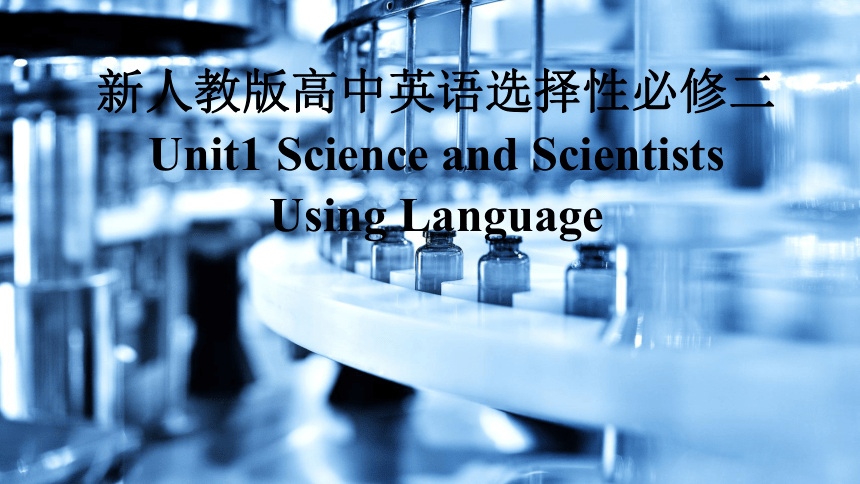
|
|
| 格式 | pptx | ||
| 文件大小 | 19.6MB | ||
| 资源类型 | 教案 | ||
| 版本资源 | 人教版(2019) | ||
| 科目 | 英语 | ||
| 更新时间 | 2023-11-09 00:00:00 | ||
图片预览

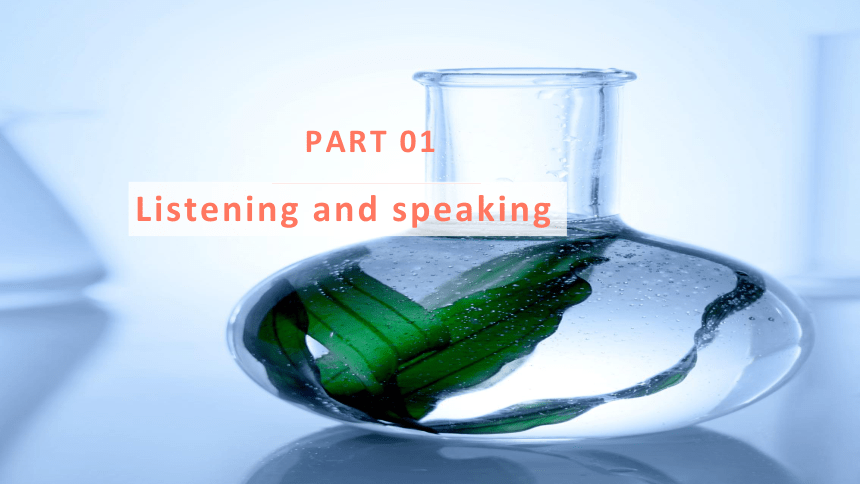
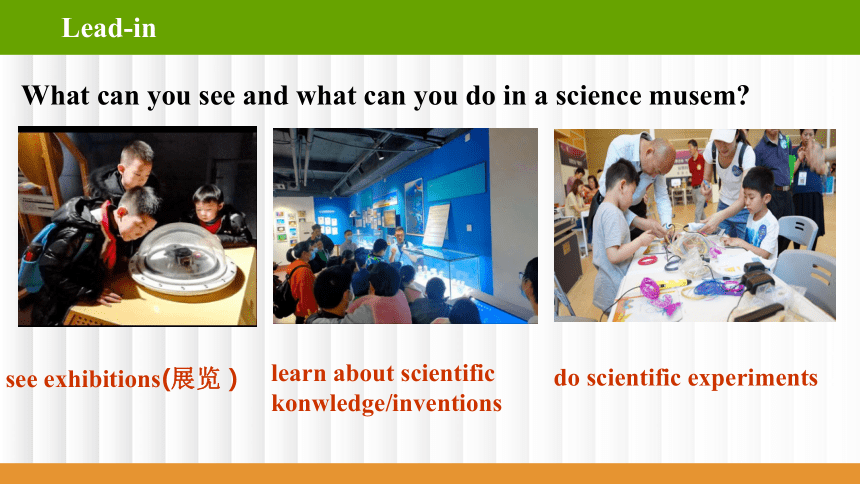
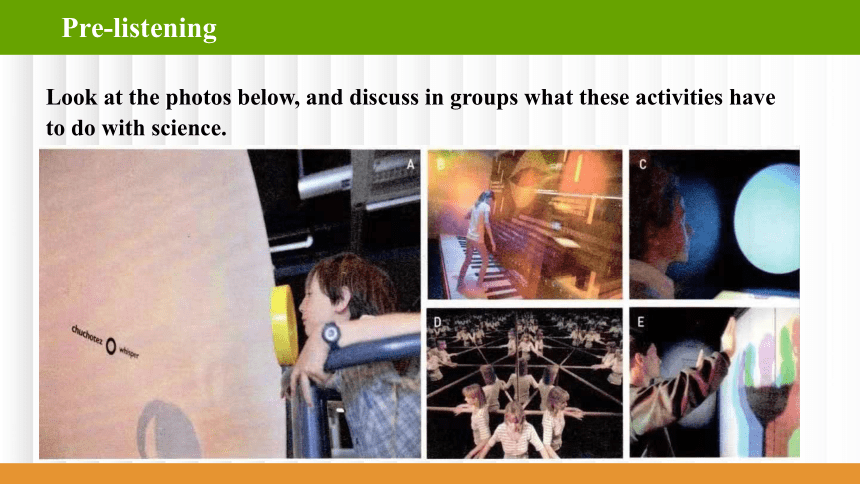
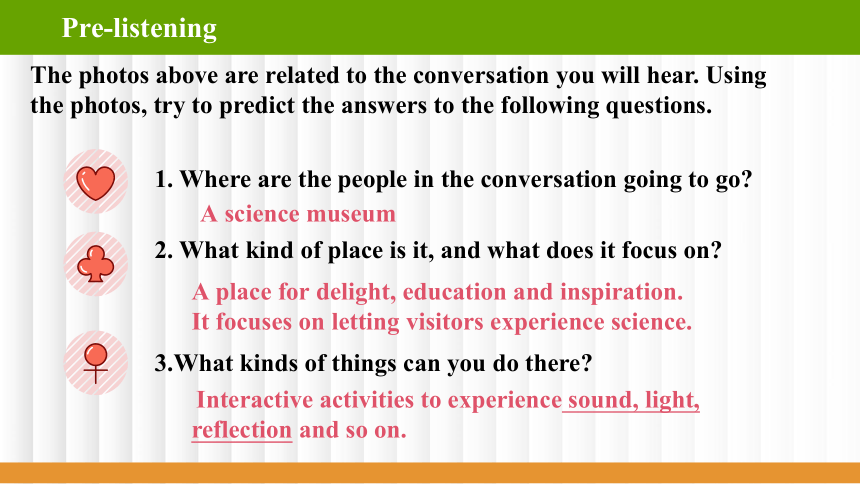
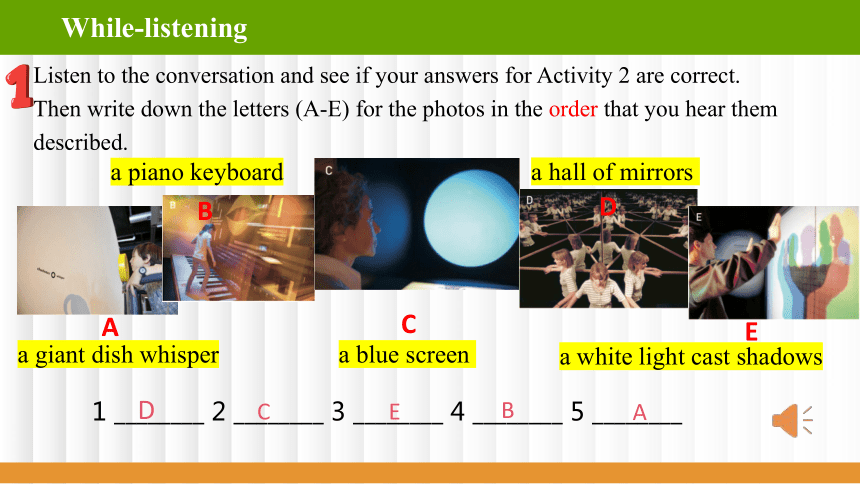
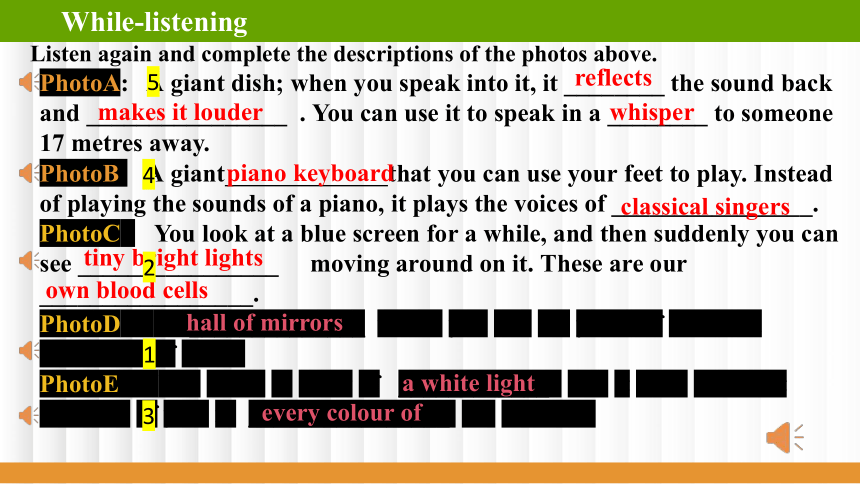
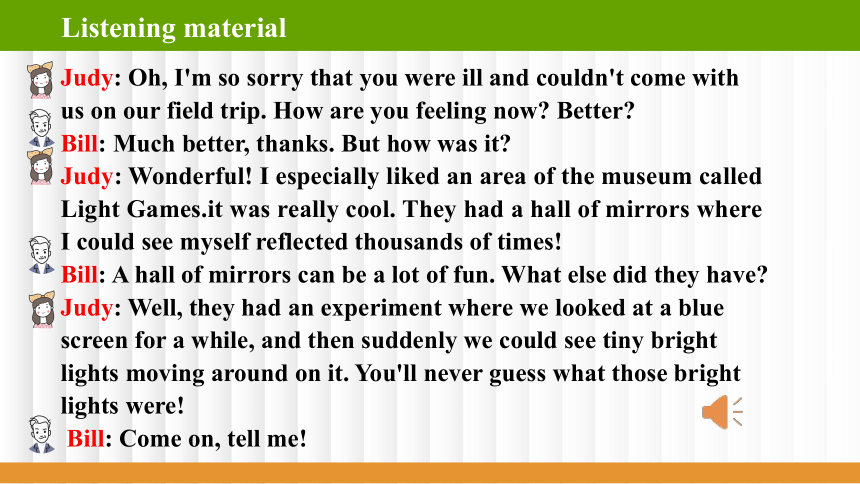
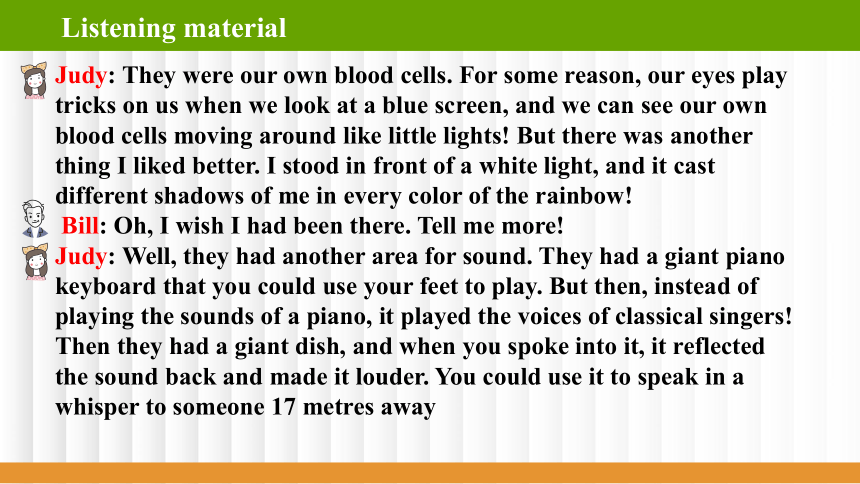
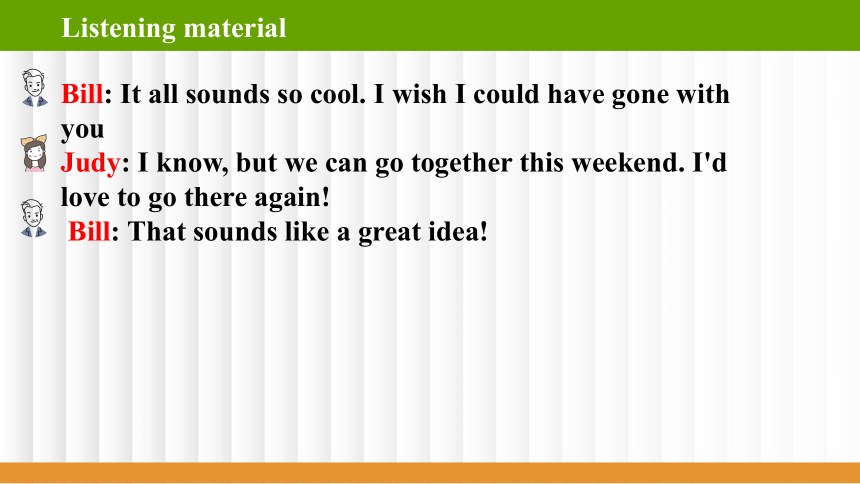
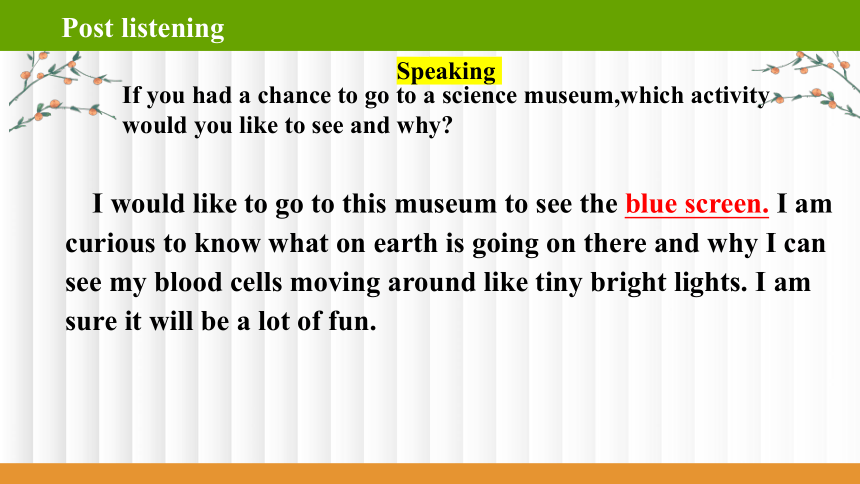
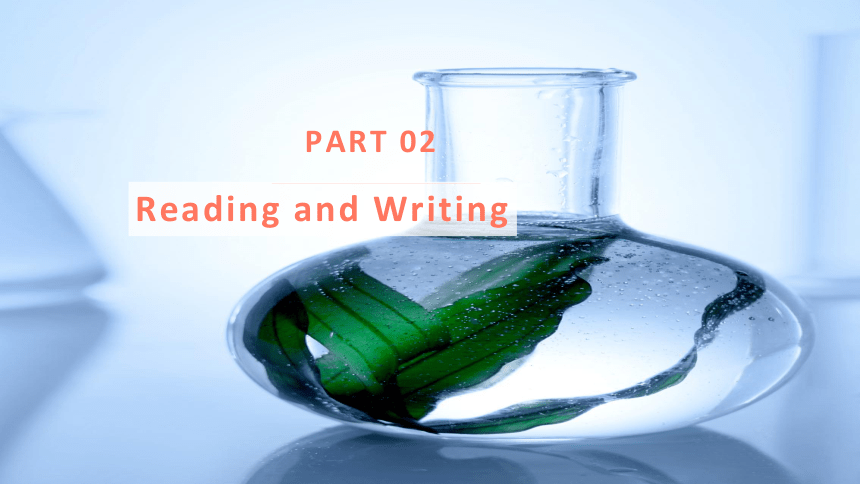
文档简介
(共48张PPT)
新人教版高中英语选择性必修二Unit1 Science and Scientists
Using Language
PART 01
Listening and speaking
What can you see and what can you do in a science musem
see exhibitions(展览)
learn about scientific konwledge/inventions
do scientific experiments
Lead-in
Look at the photos below, and discuss in groups what these activities have to do with science.
Pre-listening
1. Where are the people in the conversation going to go
The photos above are related to the conversation you will hear. Using the photos, try to predict the answers to the following questions.
2. What kind of place is it, and what does it focus on
A science museum
A place for delight, education and inspiration.
It focuses on letting visitors experience science.
Interactive activities to experience sound, light, reflection and so on.
3.What kinds of things can you do there
Pre-listening
Listen to the conversation and see if your answers for Activity 2 are correct. Then write down the letters (A-E) for the photos in the order that you hear them described.
1 ________ 2 ________ 3 ________ 4 ________ 5 ________
D
C
E
B
A
a giant dish whisper
A
B
C
D
E
a piano keyboard
a blue screen
a hall of mirrors
a white light cast shadows
While-listening
Listen again and complete the descriptions of the photos above.
PhotoA: A giant dish; when you speak into it, it ________ the sound back and ________________ . You can use it to speak in a ________ to someone 17 metres away.
PhotoB: A giant that you can use your feet to play. Instead of playing the sounds of a piano, it plays the voices of ________________.
PhotoC: You look at a blue screen for a while, and then suddenly you can see ________________ moving around on it. These are our _________________.
PhotoD: A ______________ where you can see yourself reflected thousands of times.
PhotoE: You stand in front of ____________ , and it casts different shadows of you, in ________________ the rainbow.
reflects
makes it louder
whisper
piano keyboard
classical singers
tiny bright lights
own blood cells
hall of mirrors
a white light
every colour of
5
4
2
1
3
While-listening
Judy: Oh, I'm so sorry that you were ill and couldn't come with us on our field trip. How are you feeling now Better
Bill: Much better, thanks. But how was it
Judy: Wonderful! I especially liked an area of the museum called Light Games.it was really cool. They had a hall of mirrors where I could see myself reflected thousands of times!
Bill: A hall of mirrors can be a lot of fun. What else did they have
Judy: Well, they had an experiment where we looked at a blue screen for a while, and then suddenly we could see tiny bright lights moving around on it. You'll never guess what those bright lights were!
Bill: Come on, tell me!
Listening material
Judy: They were our own blood cells. For some reason, our eyes play tricks on us when we look at a blue screen, and we can see our own blood cells moving around like little lights! But there was another thing I liked better. I stood in front of a white light, and it cast different shadows of me in every color of the rainbow!
Bill: Oh, I wish I had been there. Tell me more!
Judy: Well, they had another area for sound. They had a giant piano keyboard that you could use your feet to play. But then, instead of playing the sounds of a piano, it played the voices of classical singers! Then they had a giant dish, and when you spoke into it, it reflected the sound back and made it louder. You could use it to speak in a whisper to someone 17 metres away
Listening material
Bill: It all sounds so cool. I wish I could have gone with you
Judy: I know, but we can go together this weekend. I'd love to go there again!
Bill: That sounds like a great idea!
Listening material
If you had a chance to go to a science museum,which activity would you like to see and why
I would like to go to this museum to see the blue screen. I am curious to know what on earth is going on there and why I can see my blood cells moving around like tiny bright lights. I am sure it will be a lot of fun.
Speaking
Post listening
PART 02
Reading and Writing
Look at the pictures& the title to guess what the content of the text is.
The text is mainly about
the brief introduction of Qian Xuesen and Stephen Hawking.
THE FATHER OF CHINA’S AEROSPACE
A WORLD OF PURE THOUGHT
What do you know about them
Pre-reading
1911:_____________in Hangzhou, Zhejiang Province
1934:graduated from____________
______________
PH.D degree:___________and mathematics
Occupation:_________ and researcher
1955: __________ China
1956: ____________ the first research institute of rockets ans missiles
Title(头衔): Father of ______________
October 31,2009:_______________
Famous saying:
____________ is in China;
_____________is in China;
_____________ is in China.
Watch the video and learn about Qian Xuesen.
returned to
China’s Missiles
aerospace
teacher
Born in
Shanghai
Jiao Tong University
set up
passed away
My career
My success
My destination
Patriotic
钱学森(1911-2009) ,享誉海内
外的杰出科学家,我国导弹、原子弹和人造
卫星研究领域的开拓者,航天科学的奠基人。1991年国务院、中央军委授予他“国家杰出贡献科学家”荣誉称号和“一级英雄模范奖章”, 以表彰他对我国科技事业作出的杰出贡献。1999年中共中央、国务院、中央军委作出决定,授予钱学森“两弹一星功勋奖章”。
Activity 1 : Read for the text type and the structure
Biography
Part 1
Part 2
Part 3
Part 4
Para 1 Introduction
Para 2-5 Personal experience
Para 6 Personality
Para 7 Death
Activity 2 : Read for information
Para 1
What do people think of Qian Xuesen
has the greatest impact on China's aerospace science
a man with “great scientific thought and scientific spirit”
patriotic and served his homeland with effort, achievement, and devotion
extremely well-respected
Para 2-5
timeline of education and work experience of Qian Xuesen
1911
born in Shanghai
1932
studied aviation
entered SJT University
1935
went to the USA
1930s
helped conduct research
as a graduate assistant at CIT
1940s
founded the JPL
a pioneer in American jet and rocket technology
1955
returned to China
the development of China's rocket science and space and missile programme
1955
poor and undeveloped
no institute or university with rockey science as a major
no talents or experts
1970
first man-made satellite, Dong Fang Hong I
developed the Dongfeng missiles
the first generation of Long March rockets
1. Why did QianXuesen changed his major
2. Why was Qian called “the father of China’s aerospace”
2. Why was Qian called “the father of China’s aerospace”
Para 6-7
What kind of people is Qian Xuesen
knowledgeable
outstanding
creative
strong interest in other things
deep appreciation for art
patriotic
Any supportive examples
Activity 3 : Read for supportive examples
Personality / qualities Supportive examples
① patriotic
② knowledgeable
③ determined
④ outstanding and creative
2. switched his major to aviation
3. became a pioneer in American jet and rocket technology
4. conduct important research into rocket propulsion
5. founded the Jet Propulsion Laboratory
6. returned to China
7. in charge of not only developing China’s rocket science but also
its space and missile programme
8. did not let that discourage him from taking on the challenge
9. developed the Dongfeng missiles
10. successfully launched its first man-made satellite
11. be traced back to Qian's research
12. his strong interest in other things
13. his deep appreciation for art
has a wide range
of interest
These makes Qian a great scientist !
scientific spirits !
Activity 4: Read for thinking
by the use of ________________ and _______________
descriptive words
supportive examples
descriptive words
How are Qian's scientific spirits illustrated in the passage
Activity 5 : Read for language --- linking words & phrases
Perhaps no other scientist has had a greater impact on China's aerospace science than Qian Xuesen. Described by the authors of the Story of Qian Xuesen as a man with “great scientific thought and scientific spirit” who was patriotic and served his homeland with effort, achievement, and devotion, Qian was an extremely well-respected man.
Born in Shanghai in 1911, Qian attended schools in Beijing and then entered Shanghai Jiao Tong University to study Railway Mechanical Engineering. ___________, _________ the Songhu Battle broke out in 1932, Qian made the decision to switch his major to aviation because he realised that China needed its own powerful air force to protect and defend the country.
However
after
Qian went to the United States in 1935 to pursue his graduate studies. ... now one of NASA's leading space-exploration centres.
_______ overcoming some difficulties during his final few years in the US, Qian returned to China in 1955. He received a hero's welcome from his homeland and was put in charge of not only developing China's rocket science but also its space and missile programme. ___________, China was poor and its rocket science was undeveloped. No institute or university in China offered rocket science as a major, and there were no talents or experts in this field in China. ____________, Qian did not let that discourage him from taking on the challenge. When asked “Can we Chinese possibly make missiles ”, his reply was a determined “Why not We Chinese are able to make the same things that other people make.”
At that time
After
Nevertheless
Under Qian's leadership, China developed the Dongfeng missiles, ... Dong Fang Hong I, from a Long March rocket. ____________ much of the technology behind the Shenzhou rockets can also be traced back to Qian's research, Qian earned the name of “ the father of China's aerospace”.
Qian read a lot and was extremely knowledgeable, especially in the area of frontier science research. ___________, what might have made him such an outstanding and creative scientist was probably his strong interest in other things, such as music and drawing. His deep appreciation for art often gave him inspiration in his scientific research.
On 31 October 2009, the whole country was saddened by Qian's death, and people honoured and remembered him in different ways.
However
Because
Telling the story of Qian using linkig words and phrases
Activity 6 : Sum up
How was the passage organized to show Qian Xuesen
title
structure
descriptive words
supportive examples
linking words and phrases
Does that work the same with other scientists
How to write an article about an outstanding figure
Writing Skills and Sentence Patterns
在写人物介绍时,尤其是着重于介绍其精神品质的,切记要选取该人物身上最典型的事例,用以突出人物的个性和品质。
Para.1
Para.2
Para.3
【写作方法】
人物概况:
(Brief information -- 名字,身份,头衔)
主体:
人物事迹及科学家精神。(personal experience+qualities)
(1)人物的事迹+其体现的科学家精神,主要事迹和精神一定要匹配;(2)主要事迹可以按时间顺序,一个事迹不够,事迹太多字数会超过,选取两三个即可。
总结升华:
概括该人物所表现出来的科学精神及对自己的影响。
(Summary&influence-- 学习,生活,态度的影响)
首段常用句型(Brief information)
1. I am going to introduce one of my favorite scientists to you.
我向你介绍我最喜欢的一位科学家。
2. He is one of the most famous and influential scientists in…
他是在……领域最著名和有影响力的科学家之一
3. 他是第一个……的科学家。(使用不定式作定语)
He is the first scientist to…
eg. 袁隆平是第一个研制出杂交水稻的科学家。
Yuan Longping is the first scientist to develop the hybrid rice.
首段常用句型(Brief information)
过去分词做后置定语
1. sb, known as +头衔, is one of the greatest +身份+ in the world.
林巧稚,被誉为万婴之母,是中国最伟大的医生之一。
Lin Qiaozhi, known as “the mother of ten thousand babies”, is one of
the greatest doctors in China.
非限制性定语
2. Sb, who is my favorite scientist, is considered to be +头衔。
钱学森是我最喜欢的科学家,他被誉为导弹之父。
Qian Xuesen, who is my favorite scientist, is considered to be “the
father of missile.”
句型结构1: 主语,分词定语/非限制性定语从句,+ 谓语结构
①出生于:
②酷爱/对……有强烈的兴趣
③在……方面有天赋:
④从某大学某专业毕业
主体常用短语1(Brief information)(出生日期/出生地/职业/兴趣)
sb. was born in 某地/某年某月
was born on+具体日期
show great interest in (doing)
have a passion for sth.
be gifted in (doing) sth.
have a gift for (doing)sth.
graduate from +学校 in+专业
主体(personal experience & qualities)
1. Born in a…family in…, he… 在…年出生于…家庭,他…
2. In the course of…, he met a lot of difficulties. However, he was
determined and never gave up.
在……期间, 他遇到很多困难, 但是他意志坚定, 从不放弃。
3. Not only is/was/does/did he…, but also he… 他不仅……,而且……
4. He achieved fame/became famous when he… 当…的时候,他成名了。
5. He made great contributions to… 他对……做出很大贡献。
钟南山,1936年10月出生于南京;他意志坚定,对医疗事业充满兴趣/热情。
Born in October, 1936 in Nanjing, Zhong Nanshan is strong- minded/ determined, showing great interest in medical care/ having a passion for ···
句型结构2: 非谓语结构,+主句+ 非谓语结构
①做…工作
②把…奉献给…
③起关键性作用
④坚定的决心
⑤在……做贡献
⑥使某人能够做
① work as/ serve as+身份
② sb.devote ···to(doing) sth.
③ play a key role in sth.
④ strong will/ determination
⑤make a contribution to (doing) sth.
make contributions to (doing) sth.
⑥enable sb. to do sth.
主体常用短语2(Brief information)
After graduating from Southwest Agriculture College in 1953,Yuan devoted his life to researching on rice.
仿写:1960年毕业于北京医学院(Peking Medical College )后,钟南山留校任教。
After graduating from Peking Medical College, Zhong NanShan worked as a teacher there.
句型结构3:连词+非谓语结构,+主句
With strong will and great determination, Yuan achieved great success in increasing rice harvest, which solved the problem of the lack of food for many countries.
仿写:2003年春,凭借坚强的意志和专业能力,钟南山在抗击“非典”(SARS) 中做出了巨大贡献,使人们找到治愈这种疾病的方法。
句型结构4:With+名词,主句,(+定从)
In the Spring of 2003, with strong will and professional skills, Mr Zhong made a great contribution to fighting against SARS,
which enabled people to find the cure for the disease.
Famous as he is, he leads a simple life and cares little for money and fame.
仿写:尽管很危险,他在2020年初决定再一次投身到新型冠状病毒的抗疫前线( the battle agrainst ···)。
Famous as he is=Though he is famous (把从句中的表语提前,引起部分倒装,as 在此结构中指 “尽管/虽然”)
句型结构5: adj./ n. + as+主语 +be, +主句
Dangerous as it was, he was determined to take part in the battle against the new coronavirus again at the beginning of 2020.
qualities
tireless (孜孜不倦的)
persevering (坚持不懈的)
diligent (勤奋的)
selfless (无私的)
devoted (奉献的)
responsible (有责任感的)
hard-working(勤奋的)
patriotic (爱国的)
①为某人赢得好名声
②高度评价
③被授予/被称为……
④作为……而闻名
⑤树立好榜样
⑥值得我们崇拜和尊重
① gain/ win a good fame for sb.
② speak/think highly of ···
③be awarded sth. /be called···
④ be well known/ famous for ···
⑤ set a good example to sb.
⑥ deserve our admiration and respect
末段常用短语(influence)
末段常用句型(influence)
1. He inspires me to be a person like him. 他激励我成为像他一样的人。
2. 对我影响最深的是他对科学和祖国的热爱。(主语从句)
What influenced me most is his affection for science and our country.
3. 知道他的故事后,我决定不管遇到什么困难都继续前行。(现在分词作状语)
Having known his story, I make up my mind to keep going
whatever difficulties I meet.
①Having set a great example to us, Yuan is really an excellent scientist who fully deserves our admiration and respect.
仿写:他给我们树立了好的榜样,他真的是一位爱国且有责任心的医生,值得我们崇拜和尊重。
句型结构6:非谓语结构,主句,+定从
Having set a great example to us, he is really a patriotic and responsible doctor, who fully deserves our admiration and respect.
②.(其他句式积累) It is his determination that inspires me to go on when I have difficulty in learning.
仿写:正是他的无私付出和伟大贡献激励年轻人投入到医学事业中。
It is his selfless devotion and great contribution that inspire the young to devote themselves to the medical care.
句式结构7:It is+强调部分+that +剩下句子
牛顿是世界著名的科学家,关于他的故事有很多,请你根据他煮鸡蛋的故事,以“A Story of Newton”用英语写一篇短文,并据此发表一下自己对科学精神的看法。
Para.1
Para.2
Para.3
人物概况:
牛顿是一位杰出的科学家。
主体:
人物事迹及科学家精神。(personal experience+qualities)
一次,仆人让牛顿自己煮鸡蛋,他却把怀表煮了。
总结升华:
集中精力是科学家的品质
(Summary&influence-- 学习,生活,态度的影响)
(Brief information -- 名字,身份,头衔)
P18
二、要点陈述,语言规范
1.使用gifted、 outstanding、 devoted、 forget、 so ...that ...及下列汉语提示简要介绍著名科学家牛顿。
(1)牛顿是最杰出、最有天赋的科学家之一。
____________________________________________________
(2)牛顿是如此投入以至于他经常在日常生活中忘却小事。
_________________________________________________________________
(3)用倒装句升级句(2)
_____________________________________________________________________
Newton is one of the most outstanding and gifted scientists.
Newton was so devoted that he often forgot the little things in his daily life.
So devoted was Newton that he often forgot the little things in his daily life.
2.根据下列汉语提示叙述牛顿煮鸡蛋的过程
(4)一个仆人为牛顿做饭。
__________________________
(5)他想要出去。
___________________
(6)他让牛顿自己煮鸡蛋。
_____________________________________
用定语从句和动词-ing短语作状语合并句(4)、句(5)和句(6)
(7)当仆人回来时,他发现锅里正在煮的不是鸡蛋而是他的怀表。
____________________________________________________________________________________________
用what引导的主语从句和that引导的表语从句改写句(7)
A servant cooked for Newton.
He wanted to go out.
He asked Newton to cook the eggs himself.
When the servant came back,he found that not eggs but his pocket watch was being cooked in the pot.
A servant who cooked for Newton wanted to go out,asking Newton to cook the eggs himself.
When the servant came back, what he found was that not eggs but a pocket watch was being cooked in the pot.
3.根据下列汉语提示完成句子
(8)我们应该知识渊博。
__________________________
(9)我们应该全神贯注于我们正在做的事情。
_________________________________
(10)用not only ...but also ...的倒装句合并句(8)和句(9)
_________________________________________________________________________
We should be knowledgeable.
We should focus on what we are doing.
Not only should we be knowledgeable, but we should also focus on what we are doing.
Newton is one of the most outstanding and gifted scientists.So devoted was Newton that he often forgot the little things in his daily life.
Once, a servant who cooked for Newton wanted to go out,asking Newton to cook the eggs himself. However, when the servant came back, what he found was that not eggs but a pocket watch was being cooked in the pot.
From the story we can learn that to be an outstanding scientist, not only should we be knowledgeable, but we should also focus on what we are doing.
新人教版高中英语选择性必修二Unit1 Science and Scientists
Using Language
PART 01
Listening and speaking
What can you see and what can you do in a science musem
see exhibitions(展览)
learn about scientific konwledge/inventions
do scientific experiments
Lead-in
Look at the photos below, and discuss in groups what these activities have to do with science.
Pre-listening
1. Where are the people in the conversation going to go
The photos above are related to the conversation you will hear. Using the photos, try to predict the answers to the following questions.
2. What kind of place is it, and what does it focus on
A science museum
A place for delight, education and inspiration.
It focuses on letting visitors experience science.
Interactive activities to experience sound, light, reflection and so on.
3.What kinds of things can you do there
Pre-listening
Listen to the conversation and see if your answers for Activity 2 are correct. Then write down the letters (A-E) for the photos in the order that you hear them described.
1 ________ 2 ________ 3 ________ 4 ________ 5 ________
D
C
E
B
A
a giant dish whisper
A
B
C
D
E
a piano keyboard
a blue screen
a hall of mirrors
a white light cast shadows
While-listening
Listen again and complete the descriptions of the photos above.
PhotoA: A giant dish; when you speak into it, it ________ the sound back and ________________ . You can use it to speak in a ________ to someone 17 metres away.
PhotoB: A giant that you can use your feet to play. Instead of playing the sounds of a piano, it plays the voices of ________________.
PhotoC: You look at a blue screen for a while, and then suddenly you can see ________________ moving around on it. These are our _________________.
PhotoD: A ______________ where you can see yourself reflected thousands of times.
PhotoE: You stand in front of ____________ , and it casts different shadows of you, in ________________ the rainbow.
reflects
makes it louder
whisper
piano keyboard
classical singers
tiny bright lights
own blood cells
hall of mirrors
a white light
every colour of
5
4
2
1
3
While-listening
Judy: Oh, I'm so sorry that you were ill and couldn't come with us on our field trip. How are you feeling now Better
Bill: Much better, thanks. But how was it
Judy: Wonderful! I especially liked an area of the museum called Light Games.it was really cool. They had a hall of mirrors where I could see myself reflected thousands of times!
Bill: A hall of mirrors can be a lot of fun. What else did they have
Judy: Well, they had an experiment where we looked at a blue screen for a while, and then suddenly we could see tiny bright lights moving around on it. You'll never guess what those bright lights were!
Bill: Come on, tell me!
Listening material
Judy: They were our own blood cells. For some reason, our eyes play tricks on us when we look at a blue screen, and we can see our own blood cells moving around like little lights! But there was another thing I liked better. I stood in front of a white light, and it cast different shadows of me in every color of the rainbow!
Bill: Oh, I wish I had been there. Tell me more!
Judy: Well, they had another area for sound. They had a giant piano keyboard that you could use your feet to play. But then, instead of playing the sounds of a piano, it played the voices of classical singers! Then they had a giant dish, and when you spoke into it, it reflected the sound back and made it louder. You could use it to speak in a whisper to someone 17 metres away
Listening material
Bill: It all sounds so cool. I wish I could have gone with you
Judy: I know, but we can go together this weekend. I'd love to go there again!
Bill: That sounds like a great idea!
Listening material
If you had a chance to go to a science museum,which activity would you like to see and why
I would like to go to this museum to see the blue screen. I am curious to know what on earth is going on there and why I can see my blood cells moving around like tiny bright lights. I am sure it will be a lot of fun.
Speaking
Post listening
PART 02
Reading and Writing
Look at the pictures& the title to guess what the content of the text is.
The text is mainly about
the brief introduction of Qian Xuesen and Stephen Hawking.
THE FATHER OF CHINA’S AEROSPACE
A WORLD OF PURE THOUGHT
What do you know about them
Pre-reading
1911:_____________in Hangzhou, Zhejiang Province
1934:graduated from____________
______________
PH.D degree:___________and mathematics
Occupation:_________ and researcher
1955: __________ China
1956: ____________ the first research institute of rockets ans missiles
Title(头衔): Father of ______________
October 31,2009:_______________
Famous saying:
____________ is in China;
_____________is in China;
_____________ is in China.
Watch the video and learn about Qian Xuesen.
returned to
China’s Missiles
aerospace
teacher
Born in
Shanghai
Jiao Tong University
set up
passed away
My career
My success
My destination
Patriotic
钱学森(1911-2009) ,享誉海内
外的杰出科学家,我国导弹、原子弹和人造
卫星研究领域的开拓者,航天科学的奠基人。1991年国务院、中央军委授予他“国家杰出贡献科学家”荣誉称号和“一级英雄模范奖章”, 以表彰他对我国科技事业作出的杰出贡献。1999年中共中央、国务院、中央军委作出决定,授予钱学森“两弹一星功勋奖章”。
Activity 1 : Read for the text type and the structure
Biography
Part 1
Part 2
Part 3
Part 4
Para 1 Introduction
Para 2-5 Personal experience
Para 6 Personality
Para 7 Death
Activity 2 : Read for information
Para 1
What do people think of Qian Xuesen
has the greatest impact on China's aerospace science
a man with “great scientific thought and scientific spirit”
patriotic and served his homeland with effort, achievement, and devotion
extremely well-respected
Para 2-5
timeline of education and work experience of Qian Xuesen
1911
born in Shanghai
1932
studied aviation
entered SJT University
1935
went to the USA
1930s
helped conduct research
as a graduate assistant at CIT
1940s
founded the JPL
a pioneer in American jet and rocket technology
1955
returned to China
the development of China's rocket science and space and missile programme
1955
poor and undeveloped
no institute or university with rockey science as a major
no talents or experts
1970
first man-made satellite, Dong Fang Hong I
developed the Dongfeng missiles
the first generation of Long March rockets
1. Why did QianXuesen changed his major
2. Why was Qian called “the father of China’s aerospace”
2. Why was Qian called “the father of China’s aerospace”
Para 6-7
What kind of people is Qian Xuesen
knowledgeable
outstanding
creative
strong interest in other things
deep appreciation for art
patriotic
Any supportive examples
Activity 3 : Read for supportive examples
Personality / qualities Supportive examples
① patriotic
② knowledgeable
③ determined
④ outstanding and creative
2. switched his major to aviation
3. became a pioneer in American jet and rocket technology
4. conduct important research into rocket propulsion
5. founded the Jet Propulsion Laboratory
6. returned to China
7. in charge of not only developing China’s rocket science but also
its space and missile programme
8. did not let that discourage him from taking on the challenge
9. developed the Dongfeng missiles
10. successfully launched its first man-made satellite
11. be traced back to Qian's research
12. his strong interest in other things
13. his deep appreciation for art
has a wide range
of interest
These makes Qian a great scientist !
scientific spirits !
Activity 4: Read for thinking
by the use of ________________ and _______________
descriptive words
supportive examples
descriptive words
How are Qian's scientific spirits illustrated in the passage
Activity 5 : Read for language --- linking words & phrases
Perhaps no other scientist has had a greater impact on China's aerospace science than Qian Xuesen. Described by the authors of the Story of Qian Xuesen as a man with “great scientific thought and scientific spirit” who was patriotic and served his homeland with effort, achievement, and devotion, Qian was an extremely well-respected man.
Born in Shanghai in 1911, Qian attended schools in Beijing and then entered Shanghai Jiao Tong University to study Railway Mechanical Engineering. ___________, _________ the Songhu Battle broke out in 1932, Qian made the decision to switch his major to aviation because he realised that China needed its own powerful air force to protect and defend the country.
However
after
Qian went to the United States in 1935 to pursue his graduate studies. ... now one of NASA's leading space-exploration centres.
_______ overcoming some difficulties during his final few years in the US, Qian returned to China in 1955. He received a hero's welcome from his homeland and was put in charge of not only developing China's rocket science but also its space and missile programme. ___________, China was poor and its rocket science was undeveloped. No institute or university in China offered rocket science as a major, and there were no talents or experts in this field in China. ____________, Qian did not let that discourage him from taking on the challenge. When asked “Can we Chinese possibly make missiles ”, his reply was a determined “Why not We Chinese are able to make the same things that other people make.”
At that time
After
Nevertheless
Under Qian's leadership, China developed the Dongfeng missiles, ... Dong Fang Hong I, from a Long March rocket. ____________ much of the technology behind the Shenzhou rockets can also be traced back to Qian's research, Qian earned the name of “ the father of China's aerospace”.
Qian read a lot and was extremely knowledgeable, especially in the area of frontier science research. ___________, what might have made him such an outstanding and creative scientist was probably his strong interest in other things, such as music and drawing. His deep appreciation for art often gave him inspiration in his scientific research.
On 31 October 2009, the whole country was saddened by Qian's death, and people honoured and remembered him in different ways.
However
Because
Telling the story of Qian using linkig words and phrases
Activity 6 : Sum up
How was the passage organized to show Qian Xuesen
title
structure
descriptive words
supportive examples
linking words and phrases
Does that work the same with other scientists
How to write an article about an outstanding figure
Writing Skills and Sentence Patterns
在写人物介绍时,尤其是着重于介绍其精神品质的,切记要选取该人物身上最典型的事例,用以突出人物的个性和品质。
Para.1
Para.2
Para.3
【写作方法】
人物概况:
(Brief information -- 名字,身份,头衔)
主体:
人物事迹及科学家精神。(personal experience+qualities)
(1)人物的事迹+其体现的科学家精神,主要事迹和精神一定要匹配;(2)主要事迹可以按时间顺序,一个事迹不够,事迹太多字数会超过,选取两三个即可。
总结升华:
概括该人物所表现出来的科学精神及对自己的影响。
(Summary&influence-- 学习,生活,态度的影响)
首段常用句型(Brief information)
1. I am going to introduce one of my favorite scientists to you.
我向你介绍我最喜欢的一位科学家。
2. He is one of the most famous and influential scientists in…
他是在……领域最著名和有影响力的科学家之一
3. 他是第一个……的科学家。(使用不定式作定语)
He is the first scientist to…
eg. 袁隆平是第一个研制出杂交水稻的科学家。
Yuan Longping is the first scientist to develop the hybrid rice.
首段常用句型(Brief information)
过去分词做后置定语
1. sb, known as +头衔, is one of the greatest +身份+ in the world.
林巧稚,被誉为万婴之母,是中国最伟大的医生之一。
Lin Qiaozhi, known as “the mother of ten thousand babies”, is one of
the greatest doctors in China.
非限制性定语
2. Sb, who is my favorite scientist, is considered to be +头衔。
钱学森是我最喜欢的科学家,他被誉为导弹之父。
Qian Xuesen, who is my favorite scientist, is considered to be “the
father of missile.”
句型结构1: 主语,分词定语/非限制性定语从句,+ 谓语结构
①出生于:
②酷爱/对……有强烈的兴趣
③在……方面有天赋:
④从某大学某专业毕业
主体常用短语1(Brief information)(出生日期/出生地/职业/兴趣)
sb. was born in 某地/某年某月
was born on+具体日期
show great interest in (doing)
have a passion for sth.
be gifted in (doing) sth.
have a gift for (doing)sth.
graduate from +学校 in+专业
主体(personal experience & qualities)
1. Born in a…family in…, he… 在…年出生于…家庭,他…
2. In the course of…, he met a lot of difficulties. However, he was
determined and never gave up.
在……期间, 他遇到很多困难, 但是他意志坚定, 从不放弃。
3. Not only is/was/does/did he…, but also he… 他不仅……,而且……
4. He achieved fame/became famous when he… 当…的时候,他成名了。
5. He made great contributions to… 他对……做出很大贡献。
钟南山,1936年10月出生于南京;他意志坚定,对医疗事业充满兴趣/热情。
Born in October, 1936 in Nanjing, Zhong Nanshan is strong- minded/ determined, showing great interest in medical care/ having a passion for ···
句型结构2: 非谓语结构,+主句+ 非谓语结构
①做…工作
②把…奉献给…
③起关键性作用
④坚定的决心
⑤在……做贡献
⑥使某人能够做
① work as/ serve as+身份
② sb.devote ···to(doing) sth.
③ play a key role in sth.
④ strong will/ determination
⑤make a contribution to (doing) sth.
make contributions to (doing) sth.
⑥enable sb. to do sth.
主体常用短语2(Brief information)
After graduating from Southwest Agriculture College in 1953,Yuan devoted his life to researching on rice.
仿写:1960年毕业于北京医学院(Peking Medical College )后,钟南山留校任教。
After graduating from Peking Medical College, Zhong NanShan worked as a teacher there.
句型结构3:连词+非谓语结构,+主句
With strong will and great determination, Yuan achieved great success in increasing rice harvest, which solved the problem of the lack of food for many countries.
仿写:2003年春,凭借坚强的意志和专业能力,钟南山在抗击“非典”(SARS) 中做出了巨大贡献,使人们找到治愈这种疾病的方法。
句型结构4:With+名词,主句,(+定从)
In the Spring of 2003, with strong will and professional skills, Mr Zhong made a great contribution to fighting against SARS,
which enabled people to find the cure for the disease.
Famous as he is, he leads a simple life and cares little for money and fame.
仿写:尽管很危险,他在2020年初决定再一次投身到新型冠状病毒的抗疫前线( the battle agrainst ···)。
Famous as he is=Though he is famous (把从句中的表语提前,引起部分倒装,as 在此结构中指 “尽管/虽然”)
句型结构5: adj./ n. + as+主语 +be, +主句
Dangerous as it was, he was determined to take part in the battle against the new coronavirus again at the beginning of 2020.
qualities
tireless (孜孜不倦的)
persevering (坚持不懈的)
diligent (勤奋的)
selfless (无私的)
devoted (奉献的)
responsible (有责任感的)
hard-working(勤奋的)
patriotic (爱国的)
①为某人赢得好名声
②高度评价
③被授予/被称为……
④作为……而闻名
⑤树立好榜样
⑥值得我们崇拜和尊重
① gain/ win a good fame for sb.
② speak/think highly of ···
③be awarded sth. /be called···
④ be well known/ famous for ···
⑤ set a good example to sb.
⑥ deserve our admiration and respect
末段常用短语(influence)
末段常用句型(influence)
1. He inspires me to be a person like him. 他激励我成为像他一样的人。
2. 对我影响最深的是他对科学和祖国的热爱。(主语从句)
What influenced me most is his affection for science and our country.
3. 知道他的故事后,我决定不管遇到什么困难都继续前行。(现在分词作状语)
Having known his story, I make up my mind to keep going
whatever difficulties I meet.
①Having set a great example to us, Yuan is really an excellent scientist who fully deserves our admiration and respect.
仿写:他给我们树立了好的榜样,他真的是一位爱国且有责任心的医生,值得我们崇拜和尊重。
句型结构6:非谓语结构,主句,+定从
Having set a great example to us, he is really a patriotic and responsible doctor, who fully deserves our admiration and respect.
②.(其他句式积累) It is his determination that inspires me to go on when I have difficulty in learning.
仿写:正是他的无私付出和伟大贡献激励年轻人投入到医学事业中。
It is his selfless devotion and great contribution that inspire the young to devote themselves to the medical care.
句式结构7:It is+强调部分+that +剩下句子
牛顿是世界著名的科学家,关于他的故事有很多,请你根据他煮鸡蛋的故事,以“A Story of Newton”用英语写一篇短文,并据此发表一下自己对科学精神的看法。
Para.1
Para.2
Para.3
人物概况:
牛顿是一位杰出的科学家。
主体:
人物事迹及科学家精神。(personal experience+qualities)
一次,仆人让牛顿自己煮鸡蛋,他却把怀表煮了。
总结升华:
集中精力是科学家的品质
(Summary&influence-- 学习,生活,态度的影响)
(Brief information -- 名字,身份,头衔)
P18
二、要点陈述,语言规范
1.使用gifted、 outstanding、 devoted、 forget、 so ...that ...及下列汉语提示简要介绍著名科学家牛顿。
(1)牛顿是最杰出、最有天赋的科学家之一。
____________________________________________________
(2)牛顿是如此投入以至于他经常在日常生活中忘却小事。
_________________________________________________________________
(3)用倒装句升级句(2)
_____________________________________________________________________
Newton is one of the most outstanding and gifted scientists.
Newton was so devoted that he often forgot the little things in his daily life.
So devoted was Newton that he often forgot the little things in his daily life.
2.根据下列汉语提示叙述牛顿煮鸡蛋的过程
(4)一个仆人为牛顿做饭。
__________________________
(5)他想要出去。
___________________
(6)他让牛顿自己煮鸡蛋。
_____________________________________
用定语从句和动词-ing短语作状语合并句(4)、句(5)和句(6)
(7)当仆人回来时,他发现锅里正在煮的不是鸡蛋而是他的怀表。
____________________________________________________________________________________________
用what引导的主语从句和that引导的表语从句改写句(7)
A servant cooked for Newton.
He wanted to go out.
He asked Newton to cook the eggs himself.
When the servant came back,he found that not eggs but his pocket watch was being cooked in the pot.
A servant who cooked for Newton wanted to go out,asking Newton to cook the eggs himself.
When the servant came back, what he found was that not eggs but a pocket watch was being cooked in the pot.
3.根据下列汉语提示完成句子
(8)我们应该知识渊博。
__________________________
(9)我们应该全神贯注于我们正在做的事情。
_________________________________
(10)用not only ...but also ...的倒装句合并句(8)和句(9)
_________________________________________________________________________
We should be knowledgeable.
We should focus on what we are doing.
Not only should we be knowledgeable, but we should also focus on what we are doing.
Newton is one of the most outstanding and gifted scientists.So devoted was Newton that he often forgot the little things in his daily life.
Once, a servant who cooked for Newton wanted to go out,asking Newton to cook the eggs himself. However, when the servant came back, what he found was that not eggs but a pocket watch was being cooked in the pot.
From the story we can learn that to be an outstanding scientist, not only should we be knowledgeable, but we should also focus on what we are doing.
